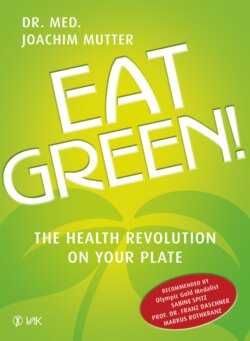Читать книгу Eat Green! - Joachim Dr. med. Mutter - Страница 20
На сайте Литреса книга снята с продажи.
Ill by fat?
ОглавлениеFor decades, the opinion was that uncontrolled consumption of saturated fats and cholesterol would lead to the constriction and degeneration of blood vessels (arteriosclerosis) and hence the secondary diseases like myocardial infarction and stroke. Because of examinations of the pathological cholesterol deposits in the blood vessels people assumed that reducing the cholesterol intake should at least prevent the cardiovascular diseases such as heart attack and stroke. And as cholesterol is only contained in animal products, experts advise against the consumption of animal fats, which is especially in butter, eggs, lard and giblets. As the blood cholesterol level is increased, among others, by saturated fats the consumption of saturated fats – that are also found in animal fats (but also in coconut-, cacao- and palm fat) – was advised against. There were also observations made that the ingestion of vegetable oils that contain a high amount of polyunsaturated fatty acids (thistle oil, sunflower oil, soy oil, canola oil, corn oil) results in a lowering of the cholesterol level.
The warnings were successful: the consumption of vegetable oils and margarine significantly rose. 150 years ago, the amount of fat consumed in large German cities was between 50–70 g per day and person. Today this value is between 120–130 g. However, the portion of animal fats (such as butter, lard, bacon or tallow) was much higher back then. Yet, the well-intentioned awareness campaigns that were also supported by medical associations were not successful in stopping the rapid increase in the number of heart attacks and strokes. Now there are new studies showing that hydrogenated vegetable fats such as margarine and conventional vegetable oils are not only harmful to the cardiovascular system but also increase the risk of cancer.11
Confusion arose due to the fact that primitive peoples that traditionally eat foods with a high cholesterol value (Somali-herders, Swiss alpine farmers, Finnish lumbermen, Massai nomads) did not show any signs of arteriosclerosis or cholesterol gall stones. Further, animal testing also drew a confusing picture: the Austrian physician, Dr. Wolfgang Lutz (“The Lutz-Diet”, “A Life Without Bread”) performed tests on chicken and found out that when they are fed without carbohydrates, they do not develop arteriosclerosis, not even at an advanced age.12 Chicken that ate a lot of carbohydrates had a significantly higher blood cholesterol value. The Danish physiologist and Nobel Prize winner Professor Dr. H. Dam was able to induce cholesterol gall stones very quickly in golden hamsters by feeding them with a diet that included no fat, but only isolated carbohydrates in the form of sugar and superfine flour.13 The pathological formation of cholesterol gall stones has the same mechanism as the development of arteriosclerosis. Professor John Yudkin, former head of the Nutrition and Ecothropologic Institute of the University of London, was able to show in studies carried out on a large number of middle-aged men that not the consumption of fat, but rather the excessive consumption of industrial sugar was responsible for the increase in the number of heart attacks.14
Finally, it became known that the predominant portion of the cholesterol in the body is not ingested through food, but it is produced in the liver. The endogenous cholesterol production is especially high when there is an absolute or chronic lack of B-vitamins. Isolated carbohydrates (saccharose, fructose, lactose, glucose, malt sugar, etc.) and superfine flour products (baked goods made of white or grey flour) practically do not contain any B-vitamins. The contrary is the case: they cause an increased depletion of the B-vitamins in the body. This is because the processing of nutritional carbohydrates to fat or energy uses up exactly these vitamins (that were contained in the skins or shells of the industrial products before being pealed!).
The increased use of vegetable oils was also harmful in another respect: Ideally, a human should ingest omega-6 and omega-3 fatty acids in a 1:1 ratio. However, conventional vegetable oils (thistle-, sunflower-, soy-, rape-, and corn oil) contain to much omega-6 fatty acids. Too much of these fatty acids promote blood clotting, heart attack, arteriosclerosis, stroke, cancer and infectious processes in the body. In order to compensate, fats with a high portion of omega-3 fatty acids have to be eaten. These amounts are only found in flaxseedoil, camelina oil, egoma oil, algal oil and fish oil. Due to industrial production, heating, light and oxygen influence as well as long storage, these oils are converted to harmful trans-fatty acids or oxidized fatty acids. These oils should therefore only be used as cold processed oils and stored in the fridge or freezer and used up quickly.15
